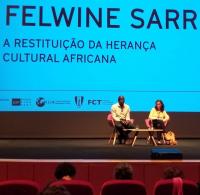restitution
Articles tagged with restitution
Tag Archive
- (Re)Imagining African Independence
- 1975
- acting
- Adolfo Luxúria Canibal
- african nations
- Afro-Caribbean
- Almada Negreiros
- Alqueva
- Amazónia
- angolan art
- angolan fashion
- Angolan Journalist
- arquitetura
- artists
- artworks
- Bruno Candé
- Cape Vert
- carbono
- Cham
- chineses
- civil war
- Claire Tancons
- communality
- conclusão
- conclusion
- Cristo do Mundo
- Cuba
- David Adjaye
- dd
- ddd
- decolonisation
- decolonization
- Diáspora
- didgeridoo
- dj marfox
- Dominique Zinkpé
- economia
- Epistemodiversity
- european parliament
- Exhibition
- Fascist Regimes
- fleeing
- Frelimo
- Gaza
- guerra
- Guinea Bissau
- independencies
- intellectual extractivism
- intersectionality
- jean rouch
- Jeux Sans Frontières
- Julie Dash
- LAC
- land-ing
- Literatura
- Looking After Freedom?
- Lula
- Luso-Tropicalism
- Manthia Diawara
- Memorization
- memory politics
- menstruation
- Moira Millán
- Mónica Miranda
- Monuments in Reverse
- mozambican artists
- musica africana
- Neo-Colonization
- photographie
- photography
- Plant Revolution!
- political agendas
- political protests
- post-memories
- postcolonialism
- rabòday music
- René Tavares
- Resgate
- reverse racism
- revista
- S.Tomé
- Sana na N’Hada
- SARS
- semba
- statues
- surrealism
- Ta-Nehisi Coates
- Tamara Dawit
- The Right to Look
- travel
- uk garage
- Viriato da Cruz
- Visual Cultural
- Vital Matter
- water
- woman
- women
- women rights
- x
- xx
 As Felwine Sarr insisted in his conference, the questions steam from the centrality of the canonic interpretation of what is a ‘cultural’ good, what is a collection, how was it formed, and above all, what power-knowledge relationship is at the core of the constitution of these collections; why is it problematic to ‘return’ the objects? Is it because it means European countries have to acknowledge their violent colonial past and that they have robbed the history and cultural production of others? Can we move beyond invisibility towards emergences (Santos, 2014)? Can we overstep the epistemic violence that shapes our times?
As Felwine Sarr insisted in his conference, the questions steam from the centrality of the canonic interpretation of what is a ‘cultural’ good, what is a collection, how was it formed, and above all, what power-knowledge relationship is at the core of the constitution of these collections; why is it problematic to ‘return’ the objects? Is it because it means European countries have to acknowledge their violent colonial past and that they have robbed the history and cultural production of others? Can we move beyond invisibility towards emergences (Santos, 2014)? Can we overstep the epistemic violence that shapes our times?  The discussion about the restitution of ethnographic works – be them artistic, documental or human remains – to the countries of origin is not new, but regained prominence two weeks ago with the announcement of Emmanuel Macron’s decision to return a bronze collection to Benin, from where the artworks were taken at the end of the 19th century in a punitive military expedition against the kingdoms of west Africa.
The discussion about the restitution of ethnographic works – be them artistic, documental or human remains – to the countries of origin is not new, but regained prominence two weeks ago with the announcement of Emmanuel Macron’s decision to return a bronze collection to Benin, from where the artworks were taken at the end of the 19th century in a punitive military expedition against the kingdoms of west Africa. 